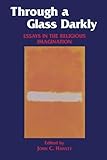Through a Glass Darkly : Essays in the Religious Imagination / John Hawley.
Material type: TextPublisher: New York, NY : Fordham University Press, [2021]Copyright date: ©1996Description: 1 online resource (299 p.)Content type:
TextPublisher: New York, NY : Fordham University Press, [2021]Copyright date: ©1996Description: 1 online resource (299 p.)Content type: - 9780823216376
- 9780823296125
- 809/.93382
- online - DeGruyter
| Item type | Current library | Call number | URL | Status | Notes | Barcode | |
|---|---|---|---|---|---|---|---|
 eBook
eBook
|
Biblioteca "Angelicum" Pont. Univ. S.Tommaso d'Aquino Nuvola online | online - DeGruyter (Browse shelf(Opens below)) | Online access | Not for loan (Accesso limitato) | Accesso per gli utenti autorizzati / Access for authorized users | (dgr)9780823296125 |
Frontmatter -- CONTENTS -- ACKNOWLEDGMENTS -- INTRODUCTION -- I CHRISTIAN EUROPE -- 1. The Gospel of Mark as Myth -- 2. An Early Renaissance Guide for the Perplexed: Bernardino of Siena's De inspirationibus -- 3. Between Earth and Heaven: Ignatian Imagination and the Aesthetics of Liberation -- 4. Erasmus, Education, and Folly -- 5. Blind Prophecy: Milton's Figurative Mode in Paradise Lost and in Some Minor Poems -- 6. A Lesson in Reading: George Eliot and the Typological Imagination -- 7. Rouault and the Catholic Revival in France -- 8. A Life of Allegory: Type and Pattern in Historical Narratives -- II INTO THE TWENTY-FIRST CENTURY -- 9. A View from the Far Side -- 10. The Tyranny of the Secular Imagination -- 11. Religious Polyphony in the Novels of Nuruddin -- 12. The Social and Political Vision of Sri Aurobindo -- 13. Feminist Providence: Esther, Vashti, and the Duty of Disobedience in Nineteenth-Century Hermeneutics -- 14. The Buddhist Imagination in Chinese Fiction -- 15. "Behind the Curtain": Derrida and the Religious Imagination -- CONTRIBUTORS
restricted access online access with authorization star
http://purl.org/coar/access_right/c_16ec
These essays, interdisciplinary in their approach, demonstrate the variegation of the religious imagination from the broadest historical and denominational scope. By examining the works of philosophers and theologians, of poets, painters, and novelists – from Saint Mark to Jacques Derrida and from Erasmus, Loyola, and Milton to Rouault to Andrew Greeley – the essayists seek to answer the question Jesus posed to his disciples: “Who do you say that I am?” and to anticipate the equally contentious query: “How do you say who I am?”The essays together explore the religious imagination through the question of transcendence, using both the age-old Christian imagination and the contemporary world wherein the divisions between religious cultures are less fixed, an age of imaginative permeability where the absence of God is as present as the presence of God.
Mode of access: Internet via World Wide Web.
In English.
Description based on online resource; title from PDF title page (publisher's Web site, viewed 03. Jan 2023)


